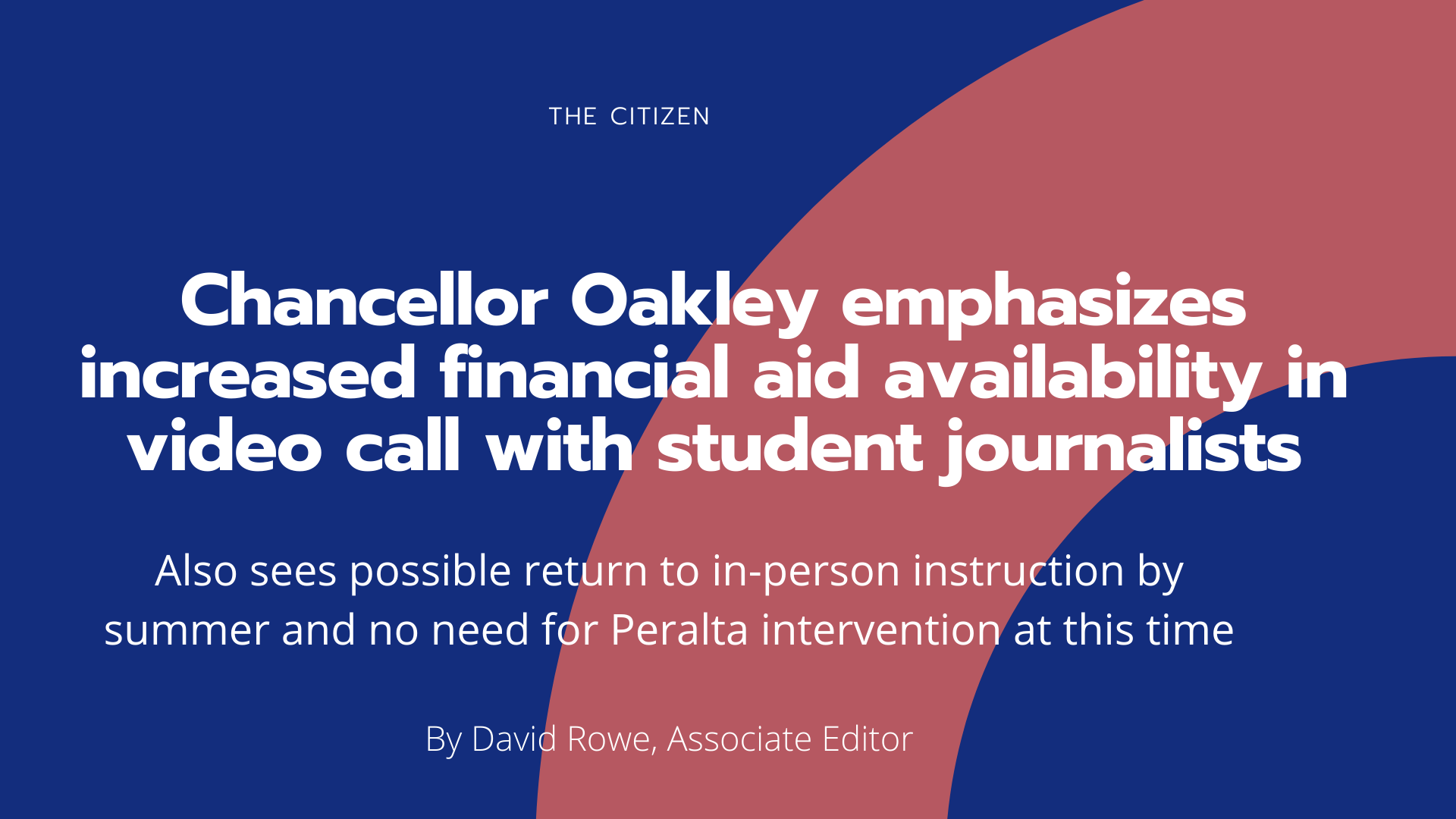In a statewide Zoom call with approximately 30 student journalists on January 26, California Community Colleges Chancellor Eloy Ortiz Oakley touched on a wide variety of topics ranging from increased student aid to the return to face-to-face instruction.
Oakley opened the hour-long session with “good news from the federal government” regarding emergency student assistance. According to Oakley, the latest stimulus package passed by Congress includes $290 million for “direct assistance to California community college students who are facing challenges due to the pandemic.” He further explained that these funds “are going to colleges directly and they’re available now.” More information is available on the California Student Aid Commission website.
Oakley said the federal funds may be supplemented with $250 million in California emergency student financial assistance grants included in the proposed state budget, which still requires approval by the legislature.
Oakley expressed concern that FAFSA (Free Application for Federal Student Aid) applications by high school seniors are down by 12% compared to a year ago and California Dream Act applications are 19% lower. “For our undocumented students, state aid is the only form of aid that they can qualify to receive,” Oakley explained. “They’re not eligible for federal financial aid.” Oakley also drew attention to an impending March 2 deadline for Cal Grants.
Oakley described the resumption of in-person instruction as a “fluid situation” due to rapidly changing circumstances.
“We are beginning to think about fall of 2021, or even this summer, to see some possible in-person instruction begin to happen,” Oakley stated. He emphasized that masks and physical distancing requirements will still be in effect and cautioned students that “it won’t be what you expect to see as a normal semester, but it will be the beginning of getting back to some sort of normalcy in our system.”
Responding to a question from The Citizen about the current status of the Peralta district’s accreditation and possible state intervention, Oakley said “we are still working with the Accrediting Commission for Community and Junior Colleges (ACCJC) and we will be monitoring what happens there.”
”There is a lot of good work happening in the Peralta district. So we remain hopeful. We’re also monitoring the fiscal health of the Peralta district. At this point, we don’t see the need for intervention, but we continue to monitor the situation closely to ensure that the district can continue to carry out its obligations to its students.”

Here are Oakley’s responses to various topics raised by the student journalists during the question-and-answer portion of the call:
Communication policies of governing boards, administrators and faculty
Oakley emphasized the importance of transparency by the Boards of Trustees in addition to the “structures of participatory governance committees.”
Speaking specifically about the Peralta district, he said “we have been very clear with the Peralta leadership that communication has been a problem in the past, that it needs to improve and that they need to have clearly adopted principles guidelines and practices to ensure that the voice of all constituents are clearly heard, and that the actions that the board takes are very transparent.”
Public records requests
Oakley pointed out that the obligation for public bodies to respond to public records requests is “not just a requirement, in many instances it is the law and the California Public Records Act is very clear about that.” As previously reported in The Citizen, district officials have not been responsive to public records requests submitted by this publication.
Purchase of software at a state level
Given the issues faced by several community college districts, including Peralta, in purchasing and upgrading the PeopleSoft program, The Citizen asked Oakley about advantages to negotiating such deals on a statewide basis. Oakley, who was personally involved in the PeopleSoft implementation at Long Beach Community College, suggested that districts “work with one another to share information.” He went on to say “we are entertaining conversations about whether or not…we could provide centralized purchasing.” He believes “that is the direction we should be going since most of these products are now cloud-based.” He also revealed that “many software companies have provided us solutions during the pandemic…for low or no cost.”
Restoration of classes cancelled during pandemic
In response to a question from Santa Ana college’s el Don about the future of arts classes and others that could not feasibly be conducted online, Oakley pointed out that ”every college in the system has been held harmless for enrollment declines” during the pandemic. Therefore, he continued “they receive the same amount of revenue for the enrollment they had before the pandemic.” The goal is to prevent districts from making “drastic decisions” about permanently dropping classes affected by the pandemic.
Community-based security and mental health services
In response to a question from The Citizen, Oakley reiterated his belief that “policing in terms of our training of law enforcement has to change.” His office has encouraged districts to “do away with policing practices that target communities of color” and “tactics that are deemed out of place.” Oakley referred the journalists to a June 5, 2020 statement from his office on this topic.
With reference to mental health services, Oakley said he has “been actively advocating with the governor and legislature to increase the amount of mental health services.” Reflecting on the increased need for such services, he observed “the toll that this last year has taken on our students is tremendous.”
Vaccine administration at campuses
In response to another question from The Citizen, Oakley stated that 44 of the California community colleges have signed up to be vaccination sites and additional campuses would be “happy to step up and support the state.” The eligibility of Peralta students, faculty, and staff to receive the vaccine is primarily age-dependent. Educators, he pointed out, will be included in the 1B tier. Oakley stated that some consideration is being given to requiring proof of vaccination for students to return to in-person classes but no final decisions have been made.


























